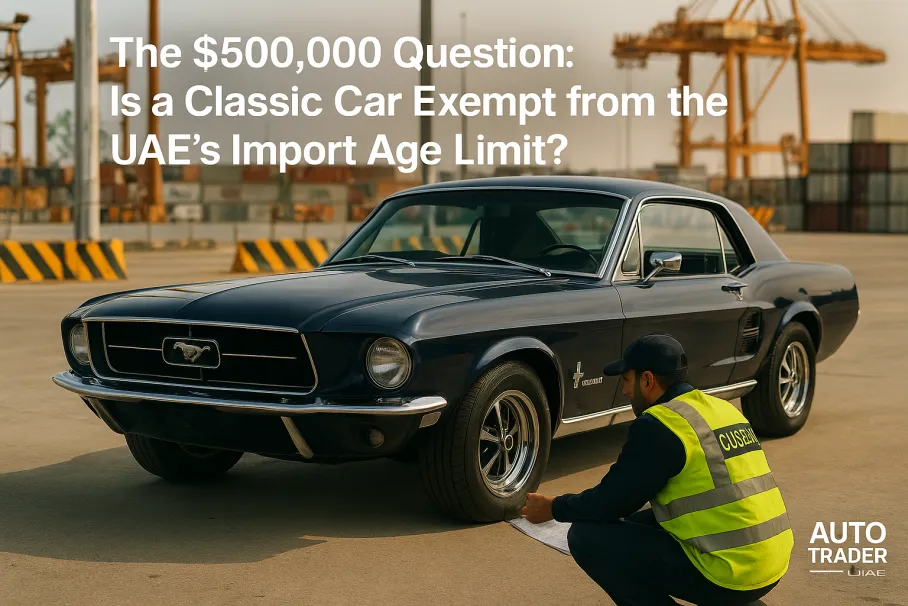The $500,000 Question: Is a Classic Car Exempt from the UAE’s Import Age Limit?
When Passion Meets Regulation
In the UAE, car import rules are famously strict — and for good reason.
The government aims to protect road safety, reduce emissions, and ensure imported vehicles meet high technical standards. Normally, you can’t import a car that’s more than 10–15 years old, depending on the category.
But what if that “old” car is a 1967 Ford Mustang, or a classic Mercedes SL worth half a million dollars?
That’s where the gray area begins — and where the law starts to make exceptions for true classics.
What Counts as a “Classic Car” in the UAE?
The Emirates Authority for Standardization and Metrology (ESMA) and RTA Dubai classify a vehicle as classic if it meets these key conditions:
- It’s at least 30 years old.
- It’s preserved in authentic, original condition.
- It’s not used for daily commuting.
- It passes a technical and safety inspection.
Once approved, the RTA issues a special “Classic” number plate and registration, allowing it to be driven occasionally — usually for events, exhibitions, or weekend leisure.
Tip: If your imported classic doesn’t qualify for “daily use,” you can still store or display it legally with a special permit.
The Import Process: How It Works Step-by-Step
- Apply for ESMA Approval
Submit detailed photos, VIN data, and proof of the car’s age.
- Customs Clearance
Pay 5% VAT plus import duties.
- Classic Car Inspection
Conducted at authorized RTA testing centers (like Tasjeel Classic Vehicle Division in Dubai).
- Registration
Once approved, you’ll receive a Classic Vehicle Registration Card and a distinct plate.
This process can take 2–4 weeks, depending on documentation and inspection results.
Costs & Hidden Challenges
Importing a vintage car to the UAE isn’t for the faint-hearted — or the light-walleted.
- Shipping costs: $5,000–$15,000 (depending on route and insurance)
- Customs & VAT: around 5% of the declared car value
- Inspection & registration fees: AED 3,000–6,000
- Restoration costs: potentially tens of thousands if the vehicle needs tuning for UAE conditions
Yet for passionate collectors, these numbers don’t matter much — because they’re buying history, not just metal.
Why Enthusiasts Still Take the Leap
Owning a classic car in Dubai isn’t about practicality — it’s about preserving art on wheels.
The UAE’s love for automotive heritage has even led to special events like the Emirates Classic Car Festival and Sharjah Classic Cars Museum, celebrating timeless machines from every era.
So, while the law is clear, the passion often speaks louder:
“You don’t buy a classic car — you become its next caretaker.”
Which Cars Qualify Most Easily?
Popular “exempt-eligible” models often include:
Collectors say German and Japanese classics are the easiest to register due to stronger global documentation and parts availability.
Explore more
Q&A: Common Questions About Classic Car Imports
Q1: Can I daily-drive my classic car once registered?
Not really. The RTA limits classic car road use mainly to weekends, exhibitions, and special events.
Q2: What happens if I import a 25-year-old car that isn’t a “classic”?
It will likely be rejected at customs, unless proven to meet ESMA’s exception list.
Q3: Are left-hand drive classic cars allowed?
Yes — as long as the vehicle is deemed collectible and passes the inspection.
Q4: Do electric conversions affect approval?
Yes, heavily. Modified classics must pass RTA modification standards, and EV conversions require an additional safety compliance certificate.
Final Paragraph
If you’re a collector or investor looking for classic or used cars in Dubai, visit Auto Trader UAE — the trusted marketplace to explore, compare, and buy from verified dealers and private sellers across the Emirates.

